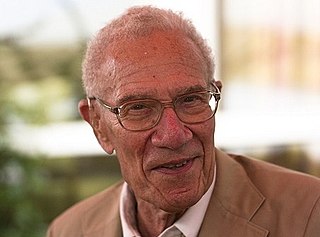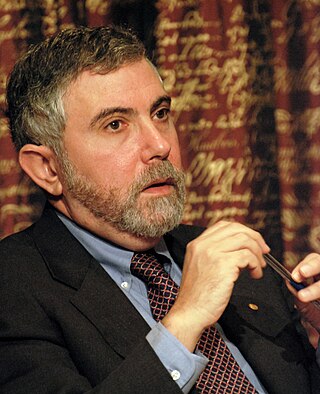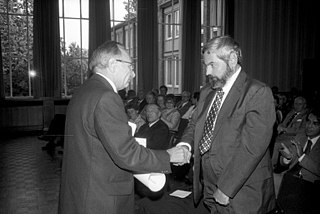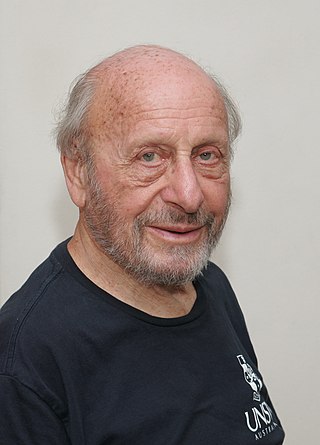Related Research Articles

Joseph Eugene Stiglitz is an American New Keynesian economist, a public policy analyst, and a full professor at Columbia University. He is a recipient of the Nobel Memorial Prize in Economic Sciences (2001) and the John Bates Clark Medal (1979). He is a former senior vice president and chief economist of the World Bank. He is also a former member and chairman of the Council of Economic Advisers. He is known for his support of Georgist public finance theory and for his critical view of the management of globalization, of laissez-faire economists, and of international institutions such as the International Monetary Fund and the World Bank.

Robert Cox Merton is an American economist, Nobel Memorial Prize in Economic Sciences laureate, and professor at the MIT Sloan School of Management, known for his pioneering contributions to continuous-time finance, especially the first continuous-time option pricing model, the Black–Scholes–Merton model. In 1993 Merton co-founded hedge fund Long-Term Capital Management.

Robert Merton Solow, GCIH is an American economist whose work on the theory of economic growth culminated in the exogenous growth model named after him. He is currently Emeritus Institute Professor of Economics at the Massachusetts Institute of Technology, where he has been a professor since 1949. He was awarded the John Bates Clark Medal in 1961, the Nobel Memorial Prize in Economic Sciences in 1987, and the Presidential Medal of Freedom in 2014. Four of his PhD students, George Akerlof, Joseph Stiglitz, Peter Diamond and William Nordhaus later received Nobel Memorial Prizes in Economic Sciences in their own right.

Paul Robin Krugman is an American economist who is the Distinguished Professor of Economics at the Graduate Center of the City University of New York and a columnist for The New York Times. In 2008, Krugman was the winner of the Nobel Memorial Prize in Economic Sciences for his contributions to New Trade Theory and New Economic Geography. The Prize Committee cited Krugman's work explaining the patterns of international trade and the geographic distribution of economic activity, by examining the effects of economies of scale and of consumer preferences for diverse goods and services.

Sir James Alexander Mirrlees was a British economist and winner of the 1996 Nobel Memorial Prize in Economic Sciences. He was knighted in the 1997 Birthday Honours.
Ronald Winthrop Jones was an influential international trade economist and retired Xerox Professor of Economics at the University of Rochester. His highly acclaimed book Globalization and the Theory of Input Trade summarizes much of his past work and also discusses the recent market trend toward fragmentation and outsourcing of the production process.
William Moore "Terence" Gorman was an Irish economist and academic. He was predominantly a theorist and is most famous for his work on aggregation and separability of goods, and in this context he developed his famous Gorman polar form. Gorman's career saw him teach at University of Birmingham, Oxford, and the London School of Economics. He was honoured with the Presidency of the Econometric Society in 1972. His work was often highly technical and theoretical in nature, which made him incomprehensible to many of his contemporaries, but his keen eye for applications has given his work a lasting influence on modern economics.

Harry Gordon Johnson, was a Canadian economist who studied topics such as international trade and international finance.
Warner Max Corden AC is an Australian economist. He is mostly known for his work on the theory of trade protection, including the development of the dutch disease model of international trade. He has also been active in the fields of international monetary systems, macroeconomic policies of developing countries and Australian economics. Corden, originally German, emigrated from Nazi Germany to Melbourne in 1939.
Philippe Mario Aghion FBA is a French economist who is a professor at College de France, at INSEAD, and at the London School of Economics. He is also teaching at the Paris School of Economics. Philippe Aghion was formerly the Robert C. Waggoner Professor of Economics at Harvard University. Prior to that, he was a professor at University College London, an Official Fellow at Nuffield College, Oxford, and an Assistant Professor at the Massachusetts Institute of Technology (MIT).
Patrick Lynch MRIA was an Irish economist. He believed in economic development and the co-ordination of government policy, including fiscal, social and monetary measures to invest in education and joining the European Economic Community. He favoured empirical education economics in Ireland and development economics flowing from investment in science.

Frank Horace Hahn FBA was a British economist whose work focused on general equilibrium theory, monetary theory, Keynesian economics and critique of monetarism. A famous problem of economic theory, the conditions under which money, which is intrinsically worthless, can have a positive value in a general equilibrium, is called "Hahn's problem" after him. One of Hahn's main abiding concerns was the understanding of Keynesian (Non-Walrasian) outcomes in general equilibrium situations.

Geoffrey Colin Harcourt was an Australian academic economist and leading member of the post-Keynesian school. He studied at the University of Melbourne and then at King's College, Cambridge.

Richard E. Baldwin is a professor of international economics at the Graduate Institute of International and Development Studies in Geneva, where he has been researching globalization and trade since 1991. He was the former President of the Centre for Economic Policy Research (CEPR). He is Editor-in-Chief of VoxEU, which he founded in June 2007. He is a research associate at the National Bureau of Economic Research and was twice elected as a Member of the Council of the European Economic Association. Baldwin has been called "one of the most important thinkers in this era of global disruption".
Simon Wren-Lewis is a British economist. He is a professor of economic policy at the Blavatnik School of Government at Oxford University and a Fellow of Merton College.

Kevin W. S. Roberts was the Sir John Hicks Professor of Economics at the University of Oxford until his retirement in 2020.
Kevin Hjortshøj O'Rourke, is an Irish economist and historian, who specialises in economic history and international economics. Since 2019, he has been Professor of Economics at New York University Abu Dhabi. He was Professor of Economics at Trinity College, Dublin from 2000 to 2011, and had previously taught at Columbia University and University College, Dublin. From 2011 to 2019, he was Chichele Professor of Economic History at the University of Oxford and a Fellow of All Souls College, Oxford.
William James Louden Ryan, MRIA (1923–2018), known as Louden Ryan, was an Irish economist and academic. He was Professor of Industrial Economics (1961–1967), Whately Professor of Political Economy (1967–1979) and Professor of Political Economy (1979–1985) at Trinity College Dublin. Among a number of public positions, he served as chairman of the National Economic and Social Council from 1973 to 1978 and as Governor of the Bank of Ireland from 1985 to 1991. He has been credited with playing a key role in the transformation of Ireland's economy from one based on agriculture and protectionism to one dominated by industry, free trade and services.
The Department of Economics is an academic department of the University of Oxford within the Social Sciences Division. Relatively recently founded in 1999, the department is located in the Norman Foster-designed Manor Road Building.
References
- 1 2 "CURRICULUM VITAE: J. Peter Neary" (PDF). Archived from the original (PDF) on 19 April 2021. Retrieved 23 May 2013.
- 1 2 3 4 "Home Page of Peter Neary Economics Department University of Oxford". Archived from the original on 16 June 2021. Retrieved 23 May 2013.
- ↑ "Announcement from the Department of Economics - J. Peter Neary". University of Oxford Department of Economics. Retrieved 17 June 2021.
- ↑ Besley, Tim. "Prof Peter Neary 1950-2021". Royal Economic Society. Archived from the original on 17 June 2021. Retrieved 17 June 2021.
- ↑ "Professor Peter Neary". The British Academy. Archived from the original on 30 January 2013. Retrieved 23 May 2013.
- ↑ "Who'll be hot and who'll be not in '09". Independent News & Media PLC. 12 December 2008. Retrieved 23 May 2013.
- ↑ W. Max Corden and J. Peter Neary (December 1982). "Booming Sector and De-Industrialisation in a Small Open Economy" (PDF). The Economic Journal. 92 (368): 825–848. doi:10.2307/2232670. ISSN 0013-0133. JSTOR 2232670. S2CID 154188130.